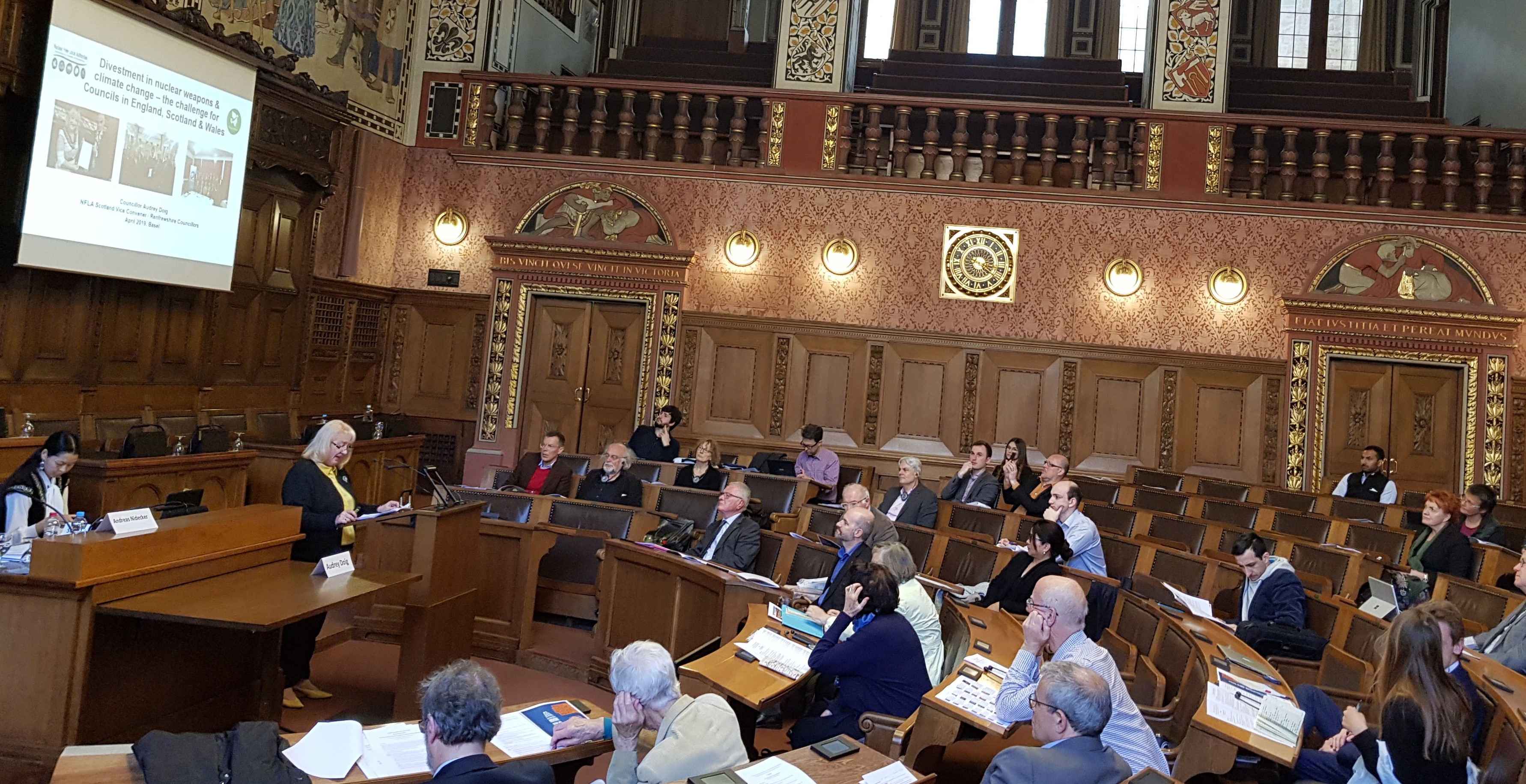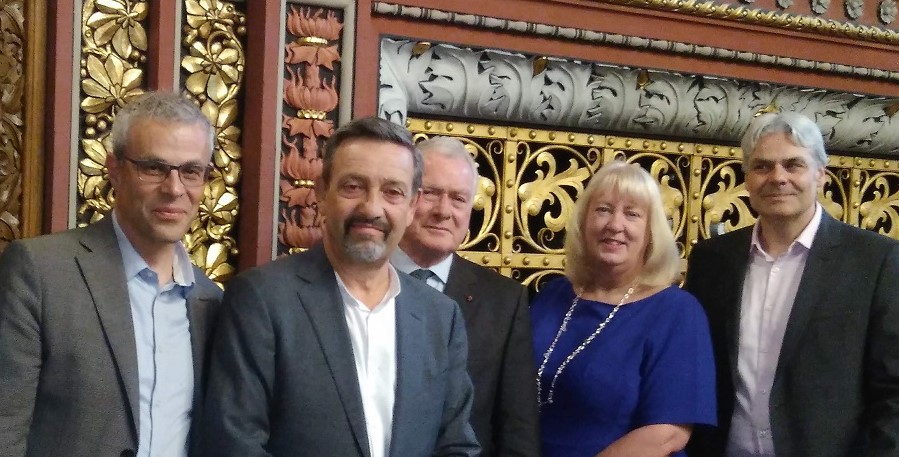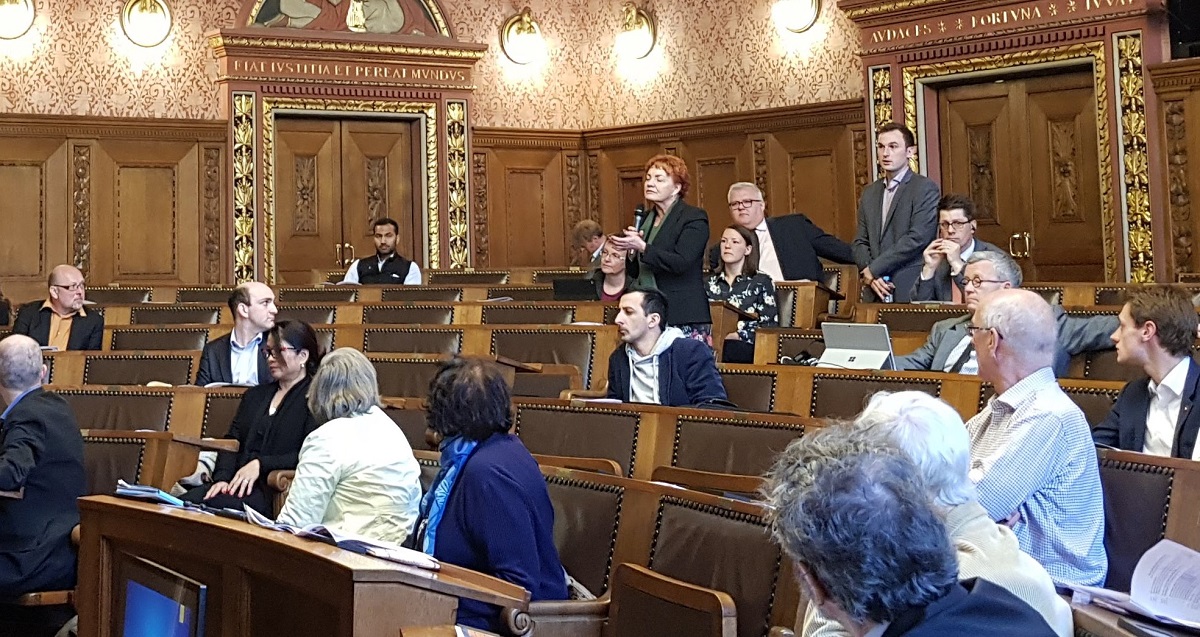The Basel-Stadt Kanton (city) hosted a unique event on April 12-13, bringing together legislators (parliamentarians and city councilors), climate change and disarmament experts, investment fund managers and activists to address and reverse the corporate and financial interests which are maintaining a fossil fuel based economy and a nuclear arms race.
The conference Move the Nuclear Weapons Money, advanced two key tools:
- divestment from nuclear weapons and fossil fuel industries, and
- investment in peace and sustainability, with a focus on investments by governments, pension funds, cities, universities, religious organisations and banks.
Policies to address the threats and impact of nuclear weapons & climate change
The conference was opened by Lukas Ott, Head of the Cantonal and City Development Unit in the Basel-Stadt Kanton President’s Department.
Mr Ott highlighted the youth-led climate demonstrations in cities around the world, and noted that ‘At a time when nuclear weapons and climate change threaten humanity, the young climate activists are correct to promote the Paris Agreement as more than a mere declaration of intent, in order to achieve carbon emission neutrality by 2030.
‘Basel was the first Swiss city to announce climate change as an emergency and to set a clear political agenda for climate protection,’ added Mr Ott. ‘We are leading by example, as the city is already running 100% on renewable energy. In addition, the Basel-Stadt Cantonal Constitution states that the canton is opposed to the use of nuclear energy and will not hold any investments in nuclear power plants.’
‘The dangers of nuclear weapons and the effects of climate change do not stop at national borders. They can only be addressed if everyone – state, civil society and private sector actors – participates in the process and takes their responsibility.’
Lukas Ott, Basel-Stadt Kanton, Member of Mayors for Peace

Audrey Doig, Deputy-Chair of the UK Nuclear-Free Local Authorities association, speaking at the Basel Conference.
Daniel Rietiker, President of the Association of Swiss Lawyers for Nuclear Disarmament, highlighted the legal imperative to end all investments in nuclear weapons. Mr Rietiker noted that countries ratifying the Treaty on the Prohibition of Nuclear Weapons (TPNW) should ban investments in nuclear weapons, as ‘“financing” is covered implicitly by the prohibition on “assisting, encouraging and inducing” in the sense of subparagraph e) of article 1 of the TPNW.’
The TPNW does not apply to countries that don’t sign or ratify the treaty. However, even in these countries there is strong customary law against the threat or use of nuclear weapons, and strong obligations in the Non-Proliferation Treaty (Article VI) requiring nuclear disarmament. Mr Rietiker argued that ‘… it cannot be claimed, in good faith, that manufacturing or modernizing nuclear weapons is compatible with that [NPT Article 6] disarmament obligation.’
General (ret) Bernard Norlain, Former Air Defense Commander (France), citing French philosopher Paul Valery ”Let’s be careful not to go into the future backwards ”, argued that nuclear weapons policies are an anachronism of the Cold War that are not only ill-suited to the security issues of today, but increase insecurity and the risk of a nuclear catastrophe.
‘We must stop sheltering behind the illusory guarantee of security constituted by the nuclear weapons and to instead engage in a serious dynamic of nuclear disarmament. This will require the development of a global project of security and of security assurance, which includes political, military and environmental aspects…. based on a global vision of security issues, which is not limited to interstate relations.’
General (ret) Bernard Norlain, Former Air Defense Commander (France)
Cllr Audrey Doig, Member of the Renfrewshire City Council and Vice Chair of Nuclear Free Local Authorities, outlined actions that cities are taking to address climate change and support nuclear disarmament, including divestment from nuclear weapons corporations and the fossil fuel industry. Cllr Doig reported that, due to greater public and media attention to the climate change issue, more progress has been made on fossil fuel divestment by city councils than on nuclear weapons divestment. She noted that to get more action on nuclear disarmament, perhaps the notion of ‘… a ‘nuclear emergency’ is needed in the same way as the understanding of a climate emergency has been generated.’

Some of the speakers from the opening day: Laurent Goetschel, Andreas Nidecker, Bernard Norlain, Audrey Doig and Lukas Ott.
Session 2: Socially responsible and impact investment. Building a peace economy
Laurent Goetschel, Executive Director of Swisspeace, spoke about impact investment, which is ‘the other side of the Socially Responsible Investment coin (as compared to divestment).’ ‘By focusing investments on economic enterprises which support sustainable development, investors can benefit from stable returns as well as the satisfaction that their investment funds are being used for the improvement of human lives and the environment. It’s a win-win for all and should be a guiding principle, at least for all public investment funds.’
Serge Stroobants, Director of European Operations for the Institute for Economics and Peace, discussed the Economic value of Peace, outlining statistical indicators that identify levels of positive peace, and which make up the Global Peace Index rankings. He reported on research by the institute on peace and its economic value versus the global cost of violence, noting that “Positive Peace creates the optimum environment for human potential to flourish”. He highlighted the direct connections between the level of peace and GDP, business potential and investment levels. “…foreign direct investment inflows are more than 2x higher in countries with higher levels of peace than in less peaceful countries”.
Bärbel Höhn, Chair of the Global Renewable Congress, highlighted advantages and positive aspects of investing in renewables for a sustainable future and contribution to a climate protection. Ms Höhn outlined the successful example of Germany as a model for other countries to move quickly from fossil fuels to renewable energies. However, she noted that globally, ‘… we are nowhere near on track to meet the goals of the Paris Agreement.’
‘The good news is that a clean energy transition is technologically feasible, and that it can act as a catalyst for achieving the Agenda 2030; the bad news is that political will still falters and vested interests resist this transformation of our energy system. Action by legislators is required to build the political will required.’
Bärbel Höhn, Chair of the Global Renewable Congress
Robert Smith, founder and president of Conscious Capital, spoke about his first-hand experience of encouraging investors on to engage in nuclear weapons divestment and socially responsible investment (SRI), including through supporting a range of impact investment projects established by Conscious Capital . He noted that in the past, investors have been hesitant to take on SRI unless they had ‘personally experienced some human or spiritual awakening that broke them out of a single focus on personal financial gain.’ However, investors are coming to realise that investment in peace and sustainability can result in a positive financial return, as well as making a contribution to a sustainable future.
‘Nuclear divestment is a critical aspect for investors to consider. If we are to allocate our capital, our energy, our resources, and our time towards achieving sustainability, to securing a bright future for all now and beyond our lifetime, we must consider the very thing that could eliminate all that we love and hold dear – the nuclear threat.’
Robert Smith, President of Conscious Capital

Slides from the presentation of Serge Stroobants demonstring the economic value of peace.
Day 2 Special session: A Peace Industrial Complex
Dr Keith Suter, Member of the Club of Rome and Foreign Affairs Editor of TV Channel 7’s Morning Show in Australia, spoke about the economic and political power of the ‘military-industrial complex’ and how to address this by building an alternative ‘peace-industrial complex.’
He noted that in order to be successful, ‘the campaign for a Peace-Industrial Complex will require our creating a holistic vision of future society to inspire a wide variety of organizations, companies and individuals to work together… In particular, the peace and disarmament movement will need to increase their dialogue with business interests in order to engage them in transition from military-based economy to a peace-based economy.’ He commended the Move the Nuclear Weapons Money campaign for including this as an important part of its campaign.
The peace and disarmament movement will need to increase their dialogue with business interests in order to engage them in transition from military-based economy to a peace-based economy.
Dr Keith Suter, Member of the Club of Rome
Day 2, Session 1: Divestment at federal, regional/state and city levels
Marit Nybaak, former Vice-President of the Norwegian Parliament, opened the session by sharing her experience of the Norwegian Government Pension Fund Global, which divested from nuclear weapons corporations in 2006 following a push to do so by parliamentarians and civil society. The divestment decision was made as part of the implementation of Section 7 of Act no. 123 of 21 December 2005 relating to the Government Pension Fund and application of the UN Global Compact principles. The investment criteria were updated by parliament in 2015 and 2016 to also consider climate change and sustainable development. See Guidelines for observation and exclusion from the fund.
Ms Nybakk noted that ‘The Fund is the largest government fund in the world. As such, decisions by the Fund on divestment for ethical, social and environmental reasons are very significant.’ Despite this, only a handful of other government funds (in New Zealand, Switzerland and Lichtenstein) have so far followed the Norwegian example of divesting from nuclear weapons, and only one (Ireland) has followed the Norwegian example of divesting from thermal coal. ‘We have seen few other national governments adopt such a sustainable investment approach,” Ms Nybaak commented. “In many cases, fear of economic losses prevents parliamentarians to support divestment, a fear which our example clearly demonstrates is unwarranted.”
She also noted that other political and economic constraints can hinder divestment decisions on the federal level. This highlights the importance of divestment at the other regulatory levels, such as by state governments and cities.
Dr Ute Finckh-Krämer, former Member of the German Bundestag and Deputy-Chair of the German Parliament Subcommittee on Disarmament and Arms Control, followed up Ms Nybakk’s comments by presenting on this topic of divestment by city and state governments. Dr Finckh-Krämer spoke in particular about divestment policy adopted by the Berlin city/state parliament. ‘Berlin ordered its own investment index for its pension fund, beginning with divestment from companies, whose business model ran against the city’s goal of carbon neutrality, and developing the investment exclusion list and the list of companies which can be part of the index to reflect more far-reaching Environment, Social and Governance (ESG) standards.’
‘Through divestment we can put pressure on the industries to change. Such action highlights the immorality (and stupidity) of making vast profits on the destruction of the planet. It also gives support to legislators who are trying to adopt and implement policies for nuclear disarmament and climate protection.’
Dr Ute Finckh-Krämer, former Member of the German Bundestag
Maaike Beenes, Program officer on humanitarian disarmament at PAX Netherlands, demonstrated the effectiveness of divestment campaigns by presenting the example of the Cluster Munitions divestment campaign. ““The pressure and publicity created by such campaigns have been shown to have an impact on the companies producing controversial weapons, like cluster munitions,” said Ms Beenes.“Financing companies that produce controversial weapons, is assisting in the production of such weapons, which is banned for signatories of certain conventions, such as the Convention on Cluster Munitions.”” (See power point presentation by Maaike)
To round out the session Dr Rudolf Rechsteiner, President of the Ethos Foundation, provided experience of fossil fuel and nuclear weapons divestment from Swiss pension funds, and argued for divestment as a necessary strategy for pension fund managers. “Only by hedging against unsustainable companies, which earnings are based on the destruction of our planet, longevity and security of investments can be guaranteed. Divestment is not a way of activism, it is fiduciary duty,” finished Dr Rechsteiner.
‘Divestment is not a way of activism, it is fiduciary duty’
Dr Rudolf Rechsteiner, President of the Ethos Foundation

Marit Nybakk makes an intervention
Day 2: Session 2: Divestment by banks, universities, religious groups and other institutions
Maaike Beenes reported on the Don’t Bank on the Bomb campaign which is focusing on moving banks to stop investing in companies involved in the production of nuclear weapons. She reported that approximately 330 banks around the world invest a total of about $525 billion in nuclear weapons companies. She highlighted that civil society can make a difference and that some banks and financial institutions, such as ABP, have divested from nuclear weapons in response to public pressure and that the move towards divestment from the nuclear weapons industry has increased with the adoption of the Treaty on the Prohibition of Nuclear Weapons in 2017.
Nishant Malapatti, Financial adviser for Blackrock USA, discussed efforts in the USA to move universities to divest from nuclear weapons. He noted that this is a new initiative, but builds on the experience of university divestment from thermal coal and other fossil fuels. Mr Malapatti noted that if one key university adopts nuclear divestment policy, it is likely that many others will follow suit.
Chayley Collis, Member of Huddersfield Quakers UK, spoke by video conference on the example of fossil fuel divestment by UK Quakers. Ms Collis led the initiative for the Huddersfield Quaker meeting (local section of Quakers) to divest from fossil fuels, a policy which has now been adopted by over 30% of UK Quaker meetings.
‘Quakers are motivated by faith to cherish the earth for future generations and to speak out against climate injustice that causes huge inequalities across the world. Our divestment action was a way in which a small group of people could make a difference –with a domino effect.’
Chayley Collis, Member of Huddersfield Quakers UK
Marzhan Nurzhan, Coordinator of the Abolition 2000 Youth Network, spoke about the actions of youth around the world for nuclear disarmament. This includes educating youth through film screenings of Where the Wind Blew and The Man who Saved the World, youth events like the International Youth Conference in Prague, youth appeals such as Reach High for a Nuclear-Weapons-Free World, events at the UN such as the upcoming youth event at the NPT Prep com in New York, and social media actions.
Ms Nurzhan noted that the Abolition 2000 Youth Network is active in the Move the Nuclear Weapons campaign, helped Basel Peace Office organize a mock counting of the €27 billion in European arms exports in January 2019 and is organizing youth to join the Count the Nuclear Weapons Money action in October.

Front and back of the mock €1 million used to ‘count out’ the €27 billion in European arms exports and shift this money to SDGs
Day 2: Session 3: Nuclear weapons impact, risk reduction and disarmament
Marc Finaud, Senior Programme Advisor at the Geneva Centre for Security Policy, pointed out dangers of relying on nuclear deterrence and provided responses to the arguments used by nuclear-armed states to justify their reliance on nuclear weapons.
In Mr Finaud’s opinion new negotiations especially between the United States and Russia need to take place and also more attention should be devoted to CTBT and FCMT. He also called for de-alerting, adoption of “no-first use” policy, reducing nuclear weapons and for freezing modernization of these weapons. Mr Finaud concluded saying that “if the ‘step-by-step’ approach is not making any progress amongst the nuclear armed and allied States, then non-nuclear weapon states have a responsibility to advance nuclear disarmament through initiatives like the Treaty on the Prohibition of Nuclear Weapons.“
Margareta Kiener Nellen, PNND member and Head of the Swiss delegation to the OSCE Parliamentary Assembly, highlighted the role of inter-parliamentary bodies like the OSCE PA and the Inter-Parliamentary Union to build dialogue and action by parliamentarians from across the political spectrum and from nuclear armed and non-nuclear States. She noted the positive role PNND plays to raise the issue at these bodies, inform the parliamentarians and move the adoption of resolutions.
Ms Kiener Nellen also highlighted the role of women in peace and security asking: “What if women ruled the world?’. (The fact that the first five Co-Presidents of PNND were all women was given as one example of the leadership of women in this field).
Andreas Nidecker, president of Basel Peace Office and Board member of Swiss Physicians for Social Responsibility (Swiss section of IPPNW), elaborated on the Humanitarian impact of nuclear weapons as rationale for nuclear divestment. As a radiology expert he shared scientifically proven information about the serious effects of radiation from nuclear weapon explosions on human health in current and future generations. He also explained other long-term effects of use or testing of nuclear weapons, such as “nuclear winter”, which would be fatal for global agriculture.
‘Besides demonstrating with our young generations on the streets of global cities against nuclear weapons and for a sustainable future, divestment from nuclear corporations is essential and must increasingly be considered by banks, pension funds, religious institutions and other organizations. In fact it may be equally or even more successful in the long than other more traditional measures to advocate for nuclear abolition and a sustainable future. The medical profession should and could further strengthen a global nuclear weapons divestment campaign.’
Prof (em) Andreas Nidecker MD, Board Member of IPPNW Swiss section.
The last presentation of the session was given by Alyn Ware, global coordinator for Parliamentarians for Nuclear Non-Proliferation and Disarmament (PNND), who focused on Parliamentary actions for a sustainable future. He highlighted the Parliamentary Action Plan for a Nuclear Weapon-Free-World, developed by PNND in cooperation with the OSCE Parliamentary Assembly and the Inter-Parliamentary Union.
Mr Ware also noted the actions PNND members are taking in nuclear-armed States on cutting nuclear weapons budgets and advancing nuclear risk-reduction measures like no-first-use, and actions PNND members are taking in non-nuclear countries on nuclear weapons divestment and nuclear weapons prohibition. (See PNND News).

Professor Andreas Nidecker leads a Q&A session at the conference
Session 4: Building the campaign – shifting economics towards peace
Fabian Hamilton MP, UK Shadow Minister for Peace and Disarmament, speaking by video message, expressed concern about the deteriorating political situation, especially in the light of recent INF Treaty collapse, and stressed role of parliamentarians in advancing nuclear risk-reduction and disarmament.
He reported on initiatives for economic conversion and defense diversification in the UK in order to protect jobs and local economies if a future UK government decided not to renew the UK nuclear submarine fleet. He noted the importance of “ensuring that skills and abilities of those [defence industry] workers is retained in pursuit of peaceful and environmentally sustainable industries that would bring more value and potential for public services”.
Jürgen Grässlin, Federal Spokesman of the German Peace Association -United War Resisters (DFG-VK), gave a presentation about preventing exports of weapons to conflict zones, introducing data on global trade in conventional weapons, including country-based information on Germany and Switzerland. He demonstrated examples of arms exporting companies and listed the top importing countries of the weapons. Mr Grässlin also shared experience of successful civil society actions against the arms trade and exports, including successful lawsuits against companies for the illegal sale of arms in the countries affected by conflict zones and human rights violations. He showed the ways of engaging public by outreaching and cooperating with more networks, organizing film festival on arms topic and peace walks against arms exports and trade.
Quique Sánchez Ochoa, Project Manager at Centre Delàs, introduced the Global campaign on military spending. He highlighted that the global military budget of 1.7 trillion dollars could be instead invested in people`s needs. He reported on global actions to tackle military expenditures taking place from April 13 to May 9 in 2019 for the Global Days of Action on Military Spending.
Alyn Ware, PNND Global Coordinator, introduced the Move the Nuclear Weapons Money Campaign, which was established by a coalition of eight international organisations and includes four main aspects: a) Cutting nuclear weapons budgets; b) Divesting from companies manufacturing nuclear weapons and their delivery systems; c) Reallocating these budgets and investments to meet economic, social and environmental need including the Sustainable Development Goals, and d) Educating and engaging legislators and civil society in the issue.
He invited everyone to join the Count the Nuclear Weapons Money action in October, at which time $1 trillion in mock dollars (the nuclear weapons budget for the next 10 years) will be counted by hand and reallocated to the SDGs. He also invited people to endorse the campaign and provide a quote, which campaign staff would turn into a meme for social media promotion.

